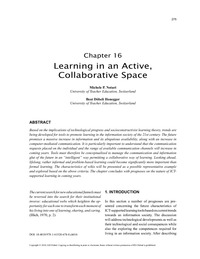Learning in an Active, Collaborative Space |
 |
 Diese Seite wurde seit 9 Jahren inhaltlich nicht mehr aktualisiert.
Unter Umständen ist sie nicht mehr aktuell.
Diese Seite wurde seit 9 Jahren inhaltlich nicht mehr aktualisiert.
Unter Umständen ist sie nicht mehr aktuell.
 Zusammenfassungen
Zusammenfassungen

 Based on the implications of technological progress and socioconstructivist learning theory, trends are being developed for tools to promote learning in the information society of the 21st century. The future promises a massive increase in information and its ubiquitous availability, along with an increase in computer-mediated communication. It is particularly important to understand that the communication requests placed on the individual and the range of available communication channels will increase in coming years. Tools must therefore be conceptualized to manage the communication and information glut of the future in an “intelligent” way permitting a collaborative way of learning. Looking ahead, lifelong, rather informal and problem-based learning could become significantly more important than formal learning. The characteristics of wikis will be presented as a possible representative example and explored based on the above criteria. The chapter concludes with prognoses on the nature of ICT-supported learning in coming years.
Based on the implications of technological progress and socioconstructivist learning theory, trends are being developed for tools to promote learning in the information society of the 21st century. The future promises a massive increase in information and its ubiquitous availability, along with an increase in computer-mediated communication. It is particularly important to understand that the communication requests placed on the individual and the range of available communication channels will increase in coming years. Tools must therefore be conceptualized to manage the communication and information glut of the future in an “intelligent” way permitting a collaborative way of learning. Looking ahead, lifelong, rather informal and problem-based learning could become significantly more important than formal learning. The characteristics of wikis will be presented as a possible representative example and explored based on the above criteria. The chapter concludes with prognoses on the nature of ICT-supported learning in coming years. Dieses Kapitel erwähnt ...
Dieses Kapitel erwähnt ...
 Dieses Kapitel erwähnt vermutlich nicht ...
Dieses Kapitel erwähnt vermutlich nicht ... 
 Nicht erwähnte Begriffe | Bildung, Concept Mapping Software, Digitalisierung, Methodenkompetenz, Sachkompetenz, Schule, Substituierbare, Unterricht |
 Tagcloud
Tagcloud
 Zitationsgraph
Zitationsgraph
 Zitationsgraph (Beta-Test mit vis.js)
Zitationsgraph (Beta-Test mit vis.js)
 Zeitleiste
Zeitleiste
 2 Erwähnungen
2 Erwähnungen 
- Empowering formative assessment using embedded Web Widgets in Wikis (Michele Notari, Sonja Schär, Martin Schellenberg) (2013)


- Mobile Learning Design - Theories and Application (Daniel Churchill, Jie Lu, Thomas K.F. Chiu, Bob Fox) (2016)

- 5. Educational Apps Ontology (Michele Notari, Michael Hielscher, Mark King)


- 5. Educational Apps Ontology (Michele Notari, Michael Hielscher, Mark King)
 Anderswo finden
Anderswo finden
 Volltext dieses Dokuments
Volltext dieses Dokuments
 Anderswo suchen
Anderswo suchen 
 Beat und dieses Kapitel
Beat und dieses Kapitel
Beat hat Dieses Kapitel während seiner Zeit am Institut für Medien und Schule (IMS) ins Biblionetz aufgenommen. Beat besitzt kein physisches, aber ein digitales Exemplar. (das er aber aus Urheberrechtsgründen nicht einfach weitergeben darf). Aufgrund der vielen Verknüpfungen im Biblionetz scheint er sich intensiver damit befasst zu haben. Es gibt bisher nur wenige Objekte im Biblionetz, die dieses Werk zitieren.









 Computer
Computer DESECO
DESECO Gesellschaft
Gesellschaft Globalisierung
Globalisierung Informationsflut
Informationsflut Informationsgesellschaft
Informationsgesellschaft Kommunikation
Kommunikation Konvergenz
Konvergenz Lernen
Lernen Mobiltelefon
Mobiltelefon Moore's law
Moore's law Motivation
Motivation Problemlösefähigkeit
Problemlösefähigkeit

 , 263 kByte)
, 263 kByte)  Biblionetz-History
Biblionetz-History